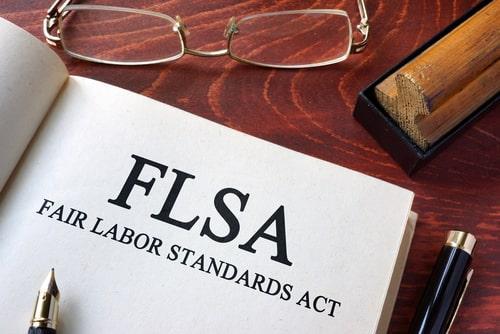
 847-995-1205
847-995-1205
Recent Blog Posts
New Stimulus Relief Bill to Help Small Business Owners
 President Trump signed a new stimulus bill into law just after Christmas, releasing another $900 billion in stimulus funds into the economy and preventing a government shutdown. The government would have shut down just before the new year if the President had not taken action. In addition to containing money to fund government operations, the spending package also includes emergency relief money that finances a new round of stimulus checks, unemployment aid, and small business assistance. A qualified employment attorney can help you learn how this new legislation may apply to you and your company, possibly saving your livelihood during this unprecedented time.
President Trump signed a new stimulus bill into law just after Christmas, releasing another $900 billion in stimulus funds into the economy and preventing a government shutdown. The government would have shut down just before the new year if the President had not taken action. In addition to containing money to fund government operations, the spending package also includes emergency relief money that finances a new round of stimulus checks, unemployment aid, and small business assistance. A qualified employment attorney can help you learn how this new legislation may apply to you and your company, possibly saving your livelihood during this unprecedented time.
Financial Assistance for Struggling Businesses
The new deal from Congress will deliver approximately $900 billion in relief funds in an effort to help families and businesses struggling due to the COVID-19 pandemic. During this round of stimulus checks issued by the U.S. government, Americans will receive up to $600 per person for those earning $75,000 or less per year in addition to $600 for each minor dependent. This is similar to the country's initial stimulus package months prior.
What Does Burden of Proof Mean for Illinois Employers?
 When you own a company, there are federal, state, and local laws you must follow in order to stay in business. Under the Fair Labor Standards Act (FLSA), U.S. employees have the right to receive a minimum hourly wage, in addition to "time-and-a-half" overtime pay when they work more than 40 hours within a seven-day period. It also prohibits the employment of minors in "oppressive child labor" conditions. If business owners do not adhere to these rules and regulations, then workers may file lawsuits against their employers if they can show that the company is in violation. However, the company can defend against such charges as long as they can prove they did not violate any laws. An experienced employment attorney can help employers with providing this "burden of proof" in Illinois.
When you own a company, there are federal, state, and local laws you must follow in order to stay in business. Under the Fair Labor Standards Act (FLSA), U.S. employees have the right to receive a minimum hourly wage, in addition to "time-and-a-half" overtime pay when they work more than 40 hours within a seven-day period. It also prohibits the employment of minors in "oppressive child labor" conditions. If business owners do not adhere to these rules and regulations, then workers may file lawsuits against their employers if they can show that the company is in violation. However, the company can defend against such charges as long as they can prove they did not violate any laws. An experienced employment attorney can help employers with providing this "burden of proof" in Illinois.
Potential Violations
There are several ways that a company can be in violation of FLSA rules, such as not paying its workers at least minimum wage or classifying them as non-exempt or contractors when they should be exempt or salaried. In other cases, upper management may use harassment tactics or discriminatory language to intimidate employees into doing certain tasks. The main areas in which an employer can be sued include:
What Is the Difference Between a Class Action and a Collective Action?
 Businesses must follow certain standards and procedures in order to remain open. A class action lawsuit is a legal claim made by employees who are seeking to collectively receive compensation from an employer for the same problem. This type of case can be in response to a faulty or defective product. A collective action is a slightly different procedure used in cases under the Fair Labor Standards Act, the Equal Pay Act, and the Age Discrimination in Employment Act. The Fair Labor Standards Act (FLSA) of 1938 is a comprehensive U.S. labor law that creates the right to a minimum wage and overtime pay when employees work more than 40 hours in a week. It also prohibits the employment of minors in “oppressive child labor.” Companies must uphold these guidelines or risk incurring penalties or legal action.
Businesses must follow certain standards and procedures in order to remain open. A class action lawsuit is a legal claim made by employees who are seeking to collectively receive compensation from an employer for the same problem. This type of case can be in response to a faulty or defective product. A collective action is a slightly different procedure used in cases under the Fair Labor Standards Act, the Equal Pay Act, and the Age Discrimination in Employment Act. The Fair Labor Standards Act (FLSA) of 1938 is a comprehensive U.S. labor law that creates the right to a minimum wage and overtime pay when employees work more than 40 hours in a week. It also prohibits the employment of minors in “oppressive child labor.” Companies must uphold these guidelines or risk incurring penalties or legal action.
Class Action
Defending Against Alleged Fair Labor Standards Act Violations in Illinois
 The Fair Labor Standards Act (FLSA) of 1938 is a United States labor law that gives workers the right to a minimum wage, as well as overtime pay when employees work more than 40 hours a week. It also prohibits employment of minors in "oppressive child labor." When a company violates any of the FLSA regulations, employees can file a lawsuit against their employer. These violations can include wage and hour violations, such as unpaid overtime and wages that fall below minimum wage.
The Fair Labor Standards Act (FLSA) of 1938 is a United States labor law that gives workers the right to a minimum wage, as well as overtime pay when employees work more than 40 hours a week. It also prohibits employment of minors in "oppressive child labor." When a company violates any of the FLSA regulations, employees can file a lawsuit against their employer. These violations can include wage and hour violations, such as unpaid overtime and wages that fall below minimum wage.
Even when business owners unintentionally violate the terms of FLSA, it is important they understand how to prepare for litigation to maintain their company's good standing. If you are an Illinois business owner who is facing such allegations, an experienced attorney can help protect your business.
FLSA Infractions
Are Remote Workers Still Entitled to Overtime Pay in Illinois?
 A typical workweek for employees in the United States consists of 40 hours. However, many workers actually spend more time performing their jobs. For jobs that are paid on an hourly basis, anything over 40 hours is usually considered overtime. Although many salaried (exempt) workers work 50-60 hours a week, they may not be eligible for overtime pay depending on their company or employment contract. The Illinois Overtime law (called the Illinois Minimum Wage Law) mirrors the Federal Fair Labor Standards Act (FLSA) in many ways. Similar to the FLSA, the Illinois overtime law requires that non-exempt employees receive overtime pay equal to 1.5 times their regular hourly pay for any hours worked over 40 in a week. With so many employees working remotely now in response to the COVID-19 health crisis, it may be difficult to track employees' hours regarding overtime if they are working from home.
A typical workweek for employees in the United States consists of 40 hours. However, many workers actually spend more time performing their jobs. For jobs that are paid on an hourly basis, anything over 40 hours is usually considered overtime. Although many salaried (exempt) workers work 50-60 hours a week, they may not be eligible for overtime pay depending on their company or employment contract. The Illinois Overtime law (called the Illinois Minimum Wage Law) mirrors the Federal Fair Labor Standards Act (FLSA) in many ways. Similar to the FLSA, the Illinois overtime law requires that non-exempt employees receive overtime pay equal to 1.5 times their regular hourly pay for any hours worked over 40 in a week. With so many employees working remotely now in response to the COVID-19 health crisis, it may be difficult to track employees' hours regarding overtime if they are working from home.
6 Common Reasons for a Contract Dispute
 A contract is defined as a legally binding agreement that recognizes and governs the rights and duties of those involved, whether it be two or more parties. An agreement typically involves the exchange of goods, services, money, or the promise of doing so later on. In today's business world, contract disputes are fairly common, regardless of the industry. When an agreement is drafted and signed, this binds the parties together for a period of time. However, when one party deviates from the terms of the agreement, this is known as a breach of contract. Employees usually have to sign a contract before starting work with a company. This can also apply to freelancers or independent contractors.
A contract is defined as a legally binding agreement that recognizes and governs the rights and duties of those involved, whether it be two or more parties. An agreement typically involves the exchange of goods, services, money, or the promise of doing so later on. In today's business world, contract disputes are fairly common, regardless of the industry. When an agreement is drafted and signed, this binds the parties together for a period of time. However, when one party deviates from the terms of the agreement, this is known as a breach of contract. Employees usually have to sign a contract before starting work with a company. This can also apply to freelancers or independent contractors.
Breach of Contract
Contract disputes typically arise as a result of one party not abiding by the terms of the contract. This can occur when a person does not perform his or her obligations or fails to comply with the rules in the agreement. In some cases, the legal agreement may have left out important information that causes a dispute. In other situations, a person may falsely represent his or her qualifications for a job or project.
Who Is Eligible for an IL Small Business Emergency Loan?
 The global pandemic of COVID-19 is on everyone's minds these days. Millions of confirmed cases have been reported, and tens of thousands of people have died in the United States due to complications from the virus. Health and government officials continue to monitor the situation very closely. In countries throughout the world, non-essential businesses and schools have been temporarily closed in an effort to stop the spread of coronavirus. Illinois Governor J.B. Pritzker issued a “stay at home” order through April 30. For those small business owners and employers who are struggling to maintain their livelihoods, there is some relief in the form of financial assistance. The Illinois Department of Commerce & Economic Opportunity (DCEO) and the Illinois Department of Financial and Professional Regulation (IDFPR) established the Illinois Small Business Emergency Loan Fund to provide small businesses with the opportunity to apply for loans up to $50,000 at a low-interest rate.
The global pandemic of COVID-19 is on everyone's minds these days. Millions of confirmed cases have been reported, and tens of thousands of people have died in the United States due to complications from the virus. Health and government officials continue to monitor the situation very closely. In countries throughout the world, non-essential businesses and schools have been temporarily closed in an effort to stop the spread of coronavirus. Illinois Governor J.B. Pritzker issued a “stay at home” order through April 30. For those small business owners and employers who are struggling to maintain their livelihoods, there is some relief in the form of financial assistance. The Illinois Department of Commerce & Economic Opportunity (DCEO) and the Illinois Department of Financial and Professional Regulation (IDFPR) established the Illinois Small Business Emergency Loan Fund to provide small businesses with the opportunity to apply for loans up to $50,000 at a low-interest rate.
Illinois Governor Files Emergency Rules for Paid Sick Leave for Coronavirus
 COVID-19, or coronavirus 2019, is a respiratory illness that can spread from animal to person or person to person. The virus was first identified during an outbreak in Wuhan, China. Currently, health officials are working on a vaccine for it, but that may take up to a year before it is approved. There is no doubt the virus has had a significant impact on people's lives since it was declared a global pandemic by the World Health Organization (WHO). Here in Illinois, Governor Pritzker said he is filing emergency rules that will allow those who cannot work because they are sick with coronavirus to collect unemployment insurance benefits to the full extent permitted by federal law. This would mean employers are required to pay workers who go on sick leave due to coronavirus.
COVID-19, or coronavirus 2019, is a respiratory illness that can spread from animal to person or person to person. The virus was first identified during an outbreak in Wuhan, China. Currently, health officials are working on a vaccine for it, but that may take up to a year before it is approved. There is no doubt the virus has had a significant impact on people's lives since it was declared a global pandemic by the World Health Organization (WHO). Here in Illinois, Governor Pritzker said he is filing emergency rules that will allow those who cannot work because they are sick with coronavirus to collect unemployment insurance benefits to the full extent permitted by federal law. This would mean employers are required to pay workers who go on sick leave due to coronavirus.
What Are the Symptoms of COVID-19?
It is imperative that a person who thinks they may have coronavirus seek medical attention to avoid life-threatening complications and reduce the spread of it. President Trump recently announced that he was halting air travel from Europe to the United States for 30 days. In addition, he advised citizens to stay away from large gatherings in an effort to contain the virus and avoid further cases of it.
What Is the Illinois Workplace Transparency Act?
 Several changes to Illinois laws went into effect on January 1, 2020. This legislation affected many different areas of the criminal justice system, including employment law. Employers are required to follow certain rules and uphold standards in order to maintain a good business standing. Companies are regulated by the Fair Labor Standards Act (FLSA), which was passed in 1938 to improve workplace conditions. Since that time, there has been a much greater focus on sexual harassment prevention in the workplace. Signed into law by Governor J.B. Pritzker in 2019, the Workplace Transparency Act (WTA) was enacted at the first of the year and is intended to prevent workplace discrimination and harassment while providing greater protections for Illinois employees. Depending on the circumstances, some employers may need to revise certain policies, training, and reporting as they relate to their employees in order to comply with the WTA.
Several changes to Illinois laws went into effect on January 1, 2020. This legislation affected many different areas of the criminal justice system, including employment law. Employers are required to follow certain rules and uphold standards in order to maintain a good business standing. Companies are regulated by the Fair Labor Standards Act (FLSA), which was passed in 1938 to improve workplace conditions. Since that time, there has been a much greater focus on sexual harassment prevention in the workplace. Signed into law by Governor J.B. Pritzker in 2019, the Workplace Transparency Act (WTA) was enacted at the first of the year and is intended to prevent workplace discrimination and harassment while providing greater protections for Illinois employees. Depending on the circumstances, some employers may need to revise certain policies, training, and reporting as they relate to their employees in order to comply with the WTA.
What Are the Consequences of Inadequate Record Keeping for Employers?
 Owning your own business and being your own boss can be very rewarding, regardless of the field of work. In the United States, there are certain rules and regulations that control how a company should operate, and these guidelines may be different depending on the industry. All companies that operate under the Fair Labor Standards Act are required to keep specific records for a designated period of time for covered, non-exempt employees. Essential documentation may include an employee's contact information, salary, work hours, and job duties. Record keeping might seem like a basic task, but if it is not done properly, this can lead to significant consequences. An experienced employment law attorney can help a business owner avoid any civil or criminal actions that they could face.
Owning your own business and being your own boss can be very rewarding, regardless of the field of work. In the United States, there are certain rules and regulations that control how a company should operate, and these guidelines may be different depending on the industry. All companies that operate under the Fair Labor Standards Act are required to keep specific records for a designated period of time for covered, non-exempt employees. Essential documentation may include an employee's contact information, salary, work hours, and job duties. Record keeping might seem like a basic task, but if it is not done properly, this can lead to significant consequences. An experienced employment law attorney can help a business owner avoid any civil or criminal actions that they could face.
Contact Us


Schaumburg, IL 60173
Phone: 847-995-1205
